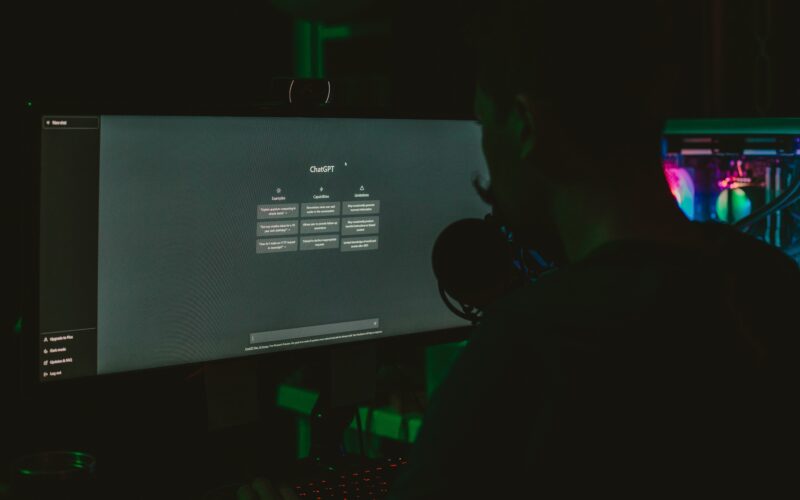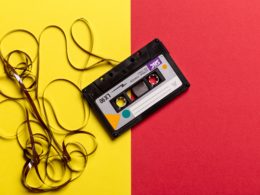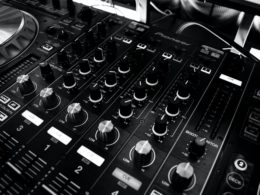In November 2020, visionary pop-star Grimes offered her prediction on the future of music: “I feel like we’re in the end of art, human art…Once there’s actually A.G.I. (“Artificial General Intelligence”), they’re gonna (sic) be so much better at making art than us.”1[1]Amanda Hatfield, Grimes thinks “live music is going to be obsolete soon”, BROOKLYN VEGAN (Nov. 20, 2019), https://www.brooklynvegan.com/grimes-thinks-live-music-is-going-to-be-obsolete-soon/. Was she on to something? Technology has played a crucial role in the evolution of music. Autotune, software-based virtual instruments, and MIDI technology have helped artists produce some of their best works and determine how listeners ultimately hear their music. Today, A.I. technology has the potential to make the human element of music entirely obsolete.
Earlier in February, DJ and producer David Guetta shared a video of one of his performances during which he used A.I. technology to insert the voice of rap artist Eminem. 2[2]Maggie Harrison, David Guetta Faked Eminem’s Vocals Using AI for New Song, FUTURISM (Feb. 10, 2023), https://futurism.com/david-guetta-faked-eminem-vocals. In an interview, Guetta explained that he directed one A.I. platform to “write a verse in the style of Eminem about future rave” and subsequently directed another to imitate Eminem’s voice.3[3]Id. Although Guetta made note that he would “obviously” not distribute the song commercially, his creative use of A.I. stirred debate over the topic.4[4]Id. Moreover, this phenomena has become a viral trend, with some fans sharing A.I.-generated content that makes pre-existing songs sound as though they are being sung by another artist such as Ariana Grande or Billie Eilish.5[5]Thania Garcia, David Guetta Replicated Eminem’s Voice in a Song Using Artificial Intelligence, VARIETY (Feb. 8, 2023), https://variety.com/2023/music/news/david-guetta-eminem-artificial-intelligence-1235516924/.
Copyright law has not given recognition to non-human artists.6[6]See Naruto v. Slater, 2016 WL 362231 (N.D. Cal. Jan. 28, 2016). Indeed, the U.S. District Court for the Northern District of California confirmed the U.S. Copyright Office’s (“USCO”) rejection of a claim that a monkey holding a camera and photographing itself was sufficient to establish the monkey as the legal author, and thus the rightsholder of the picture.7[7]Id. Further, the USCO later rejected a claim in 2019 for a piece of A.I.-generated art, emphasizing that it “lack[ed] the human authorship necessary to support a copyright claim.”8[8]Jane Recker, U.S. Copyright Office Rules A.I. Art Can’t be Copyrighted, SMITHSONIAN MAGAZINE (March 24, 2022), https://www.smithsonianmag.com/smart-news/us-copyright-office-rules-ai-art-cant-be-copyrighted-180979808/. This decision is currently being challenged in Thaler v. Perlmutter.9[9]Id. There, it is being argued that Dr. Stephen Thaler’s A.I. creation, A Recent Entrance to Paradise, is deserving of copyright protection.10[10]Id. The work was created by Dr. Thaler’s “Creativity Machine” as a “simulated near-death experience.”11[11]Id. Dr. Thaler’s attorney emphasized that “A.I. is able to make functionally creative output in the absence of a traditional human author and protecting A.I.-generated works with copyright is vital to promoting the production of socially valuable content.”12[12]Id. His motion for summary judgment contends that the A.I. should be able to qualify as an “author” under the Copyright Act under its plain and ordinary meaning.13[13]Pl.’s Mot. For Summ. J. and Br. in Supp. Thereof at 8, Thaler v. Perlmutter, No. 22-cv-01564-BAH (D.D.C. Jan. 10, 2023). Noting that corporations can be “authors” under the Act’s work made for hire doctrine, Dr. Thaler argues that an “author” need not be human.14[14]Id. at 8 n.4. He further asserts that, as the owner of the algorithm, he too owns the copyright in whatever it generates.15[15]Id. at 20.
A key distinction between works like Dr. Thaler’s and David Guetta’s is that Dr. Thaler’s did not require any human input to generate.16[16]Id. at 4. While David Guetta had to enter specific information for the A.I. to begin to create its Eminem-like verses, Dr. Thaler’s “Creativity Machine” that created A Recent Entrance to Paradise did not rely on any specific human input.17[17]Id. In fact, Dr. Thaler only manipulated the machine to simulate “death” so that he could capture what the machine “sees” as it reaches its “death.”18[18]Jane Recker, supra note 7. Moreover, Dr. Thaler’s ownership of his algorithm forms the basis of his own copyright ownership claim, whereas David Guetta’s creation involved the use of third party A.I. generators.19[19]Pl.’s Mot. For Summ. J. and Br. in Supp. Thereof, supra note 13, at 20.
Although this issue has not yet been considered in the context of A.I.-generated music, this new age of music is likely to be impacted by these advancements.20[20]Michael Huppe, Artificial Intelligence Has Big Implications For Ownership In The Music Industry, FORBES (Dec. 12, 2022), https://www.forbes.com/sites/forbesbusinesscouncil/2022/12/12/artificial-intelligence-has-big-implications-for-ownership-in-the-music-industry/?sh=38d4a7475797. Should the A.I. programmer be the rightful copyright owner? Should the works be public domain? Does the use of others’ already recorded music upon which the A.I. relies constitute infringement? And what are the implications of using an artist’s recognizable voice without consent?
In a first-of-its-kind class action filed recently in the Northern District of California, a group of artists are taking on A.I. generators Stability AI Ltd., Midjourney Inc., and DeviantArt Inc.21[21]Winston Cho, AI Art Generators Spark Multiple Copyright Lawsuits, HOLLYWOOD REPORTER (Jan. 17, 2023), https://www.hollywoodreporter.com/business/business-news/ai-art-generators-copyright-lawsuits-1235302611/. These A.I. generators work by converting an input statement into a picture or painting.22[22]Arham Islam, How Do DALL·E 2, Stable Diffusion, and Midjourney Work?, MARKTECHPOST (Nov. 14, 2022), https://www.marktechpost.com/2022/11/14/how-do-dall%C2%B7e-2-stable-diffusion-and-midjourney-work/. A user can input mere keywords, phrases and topics into the command.23[23]Amanda Hetler, Pros and cons of AI-generated content, TECHTARGET (Feb. 2, 2023), https://www.techtarget.com/whatis/feature/Pros-and-cons-of-AI-generated-content. These text-to-image tools first find pictures that match the description entered by the user and subsequently combine them to create new art.24[24]Id. The plaintiffs are claiming that these A.I. generators committed copyright infringement by farming billions of copyrighted images in order to generate its content without obtaining consent or properly compensating the artists.25[25]Winston Cho, supra note 17. The suit also alleges vicarious and contributory infringement, right of publicity violations, unfair competition, and unjust enrichment.26[26]Id. The complaint alleges that the new images are derivative works of the images initially input into the A.I. generator and argues that the A.I. tools merely allow users to create works “in the style of” an artist rather than commissioning or licensing that artist’s work.27[27]Id. It follows that this practice can unfairly rob the artist of their potential income via infringement.
In another attack on AI generating platforms, the USCO recently reconsidered the copyright protection it had previously granted to Ms. Kristina Kashtanova for her comic book Zarya of the Dawn, which features pictures created by Midjourney.28[28]Letters between Van Lindberg, counsel to Kristina Kashtanova, and Robert J. Kasunic, Associate Register of Copyrights and Director of the Office of Registration Policy & Practice (Feb. 21, 2023) (Oct. 28, 2022) (Nov. 21, 2022) (on file with the United States Copyright Office) [hereinafter Letters]. Although copyright protection was ultimately not granted to the individual images, the USCO decided that Ms. Kashtanova “is the author of the Work’s text as well as the selection, coordination, and arrangement of the Work’s written and visual elements.”29[29]Id. The artist took to Instagram, calling it a “great day” for Midjourney users, while expressing her disappointment of the USCO’s refusal to recognize her copyright ownership of the individual images.30[30]Kris Kashtanova (@kris.kashtanova), INSTAGRAM (Feb. 22, 2023), https://www.instagram.com/p/Co-aYkQumio/?hl=en. The USCO’s decision emphasized that “[t]he fact that Midjourney’s specific output cannot be predicted by users makes Midjourney different for copyright purposes than other tools used by artists.”31[31]Letters, supra note 29. Additionally, the USCO dismissed the claim that Ms. Kashtanova’s edits to the images made them eligible for copyright protection because the changes were “too minor and imperceptible to supply the necessary creativity for copyright protection.”32[32]Id.
In October 2022, two U.S. senators called for the creation of a national A.I. commission in order to consider what changes may be needed in our intellectual property laws to incentivize A.I. innovations.33[33]Letters between United States Senators Thom Tillis and Chris Coons and Kathi Vidal, Under Secretary of Commerce for Intellectual Property and Director of the United States Patent and Trademark Office, and Shira Perlmutter, Registers of Copyrights and Director of the United States Copyright Office (Oct. 27, 2022) (Dec. 12, 2022) (on file with the United States Copyright Office). In response, the USCO and the United States Patent and Trademark Office commented on the feasibility of such a commission and noted that the USCO is planning symposiums with the World Intellectual Property Organization to address the nexus of copyright law and machine learning later in 2023.34[34]Id.
Recent legal actions regarding the creative use of A.I. underscore the importance of rethinking the existing laws that govern the music industry. There are many ways to adapt the law to this inevitable issue. However, any new legal framework should strive to incentivize the innovation of non-human art while protecting the rights of the human artists who led the way.
Written by: Kathryn DeFranco
Kathryn is a 2024 J.D. Candidate at Brooklyn Law School
1 Amanda Hatfield, Grimes thinks “live music is going to be obsolete soon”, Brooklyn Vegan (Nov. 20, 2019), https://www.brooklynvegan.com/grimes-thinks-live-music-is-going-to-be-obsolete-soon/.
2 Maggie Harrison, David Guetta Faked Eminem’s Vocals Using AI for New Song, Futurism (Feb. 10, 2023), https://futurism.com/david-guetta-faked-eminem-vocals.
3 Id.
4 Id.
5 Thania Garcia, David Guetta Replicated Eminem’s Voice in a Song Using Artificial Intelligence, Variety (Feb. 8, 2023), https://variety.com/2023/music/news/david-guetta-eminem-artificial-intelligence-1235516924/.
6 See Naruto v. Slater, 2016 WL 362231 (N.D. Cal. Jan. 28, 2016).
7 Id.
8 Jane Recker, U.S. Copyright Office Rules A.I. Art Can’t be Copyrighted, Smithsonian Magazine (March 24, 2022), https://www.smithsonianmag.com/smart-news/us-copyright-office-rules-ai-art-cant-be-copyrighted-180979808/.
9 Id.
10 Id.
11 Id.
12 Id.
13 Pl.’s Mot. For Summ. J. and Br. in Supp. Thereof at 8, Thaler v. Perlmutter, No. 22-cv-01564-BAH (D.D.C. Jan. 10, 2023).
14 Id. at 8 n.4.
15 Id. at 20.
16 Id.at 4.
17 Id.
18 Jane Recker, supra note 7.
19 Pl.’s Mot. For Summ. J. and Br. in Supp. Thereof, supra note 13, at 20.
20 Michael Huppe, Artificial Intelligence Has Big Implications For Ownership In The Music Industry, Forbes (Dec. 12, 2022), https://www.forbes.com/sites/forbesbusinesscouncil/2022/12/12/artificial-intelligence-has-big-implications-for-ownership-in-the-music-industry/?sh=38d4a7475797.
21 Winston Cho, AI Art Generators Spark Multiple Copyright Lawsuits, Hollywood Reporter (Jan. 17, 2023), https://www.hollywoodreporter.com/business/business-news/ai-art-generators-copyright-lawsuits-1235302611/.
22 Arham Islam, How Do DALL·E 2, Stable Diffusion, and Midjourney Work?, Marktechpost (Nov. 14, 2022), https://www.marktechpost.com/2022/11/14/how-do-dall%C2%B7e-2-stable-diffusion-and-midjourney-work/.
23 Amanda Hetler, Pros and cons of AI-generated content, TechTarget (Feb. 2, 2023), https://www.techtarget.com/whatis/feature/Pros-and-cons-of-AI-generated-content.
24 Id.
25 Winston Cho, supra note 17.
26 Id.
27 Id.
28 Letters between Van Lindberg, counsel to Kristina Kashtanova, and Robert J. Kasunic, Associate Register of Copyrights and Director of the Office of Registration Policy & Practice (Feb. 21, 2023) (Oct. 28, 2022) (Nov. 21, 2022) (on file with the United States Copyright Office) [hereinafter Letters].
29 Id.
30 Kris Kashtanova (@kris.kashtanova), Instagram (Feb. 22, 2023), https://www.instagram.com/p/Co-aYkQumio/?hl=en.
31 Letters, supra note 29.
32 Id.
33 Letters between United States Senators Thom Tillis and Chris Coons and Kathi Vidal, Under Secretary of Commerce for Intellectual Property and Director of the United States Patent and Trademark Office, and Shira Perlmutter, Registers of Copyrights and Director of the United States Copyright Office (Oct. 27, 2022) (Dec. 12, 2022) (on file with the United States Copyright Office).
34 Id.




